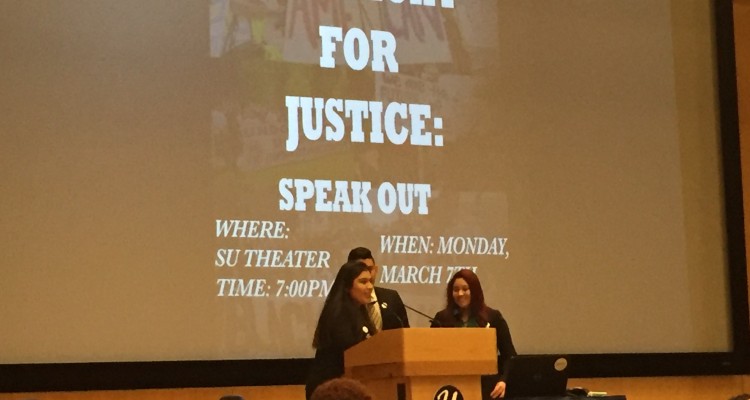By Lucia Greene
Behind every face is a story. And at last night’s Fight for Equality Speak Out, students revealed the injustices that plague undocumented students and families. As of 2015, the Immigration Policy Center reported that 1.8 million undocumented youth live in the U.S. and 7.5% go on to college.
It’s a reality that many UConn students have faced. Secretary of UConn’s Students Without Borders Daniela Doncel says no child should have to face such difficulties.
“Because no child should have to ask their parents why they have diff last names or why they don’t have a wedding ring,” she said. “Because no child should have to fear that one day they say the wrong thing and men with suits will kick their family out of their house the next day. Because no child should have to face danger in the desert as that child and the family cross over in the hopes of a better life.”
The organization teamed up with Connecticut Students for a Dream and the Black Lives Matter movement to produce this event. Their president, Karla Garcia, says the main goal is to spread awareness.
“One of our main goals is to educate the UConn campus about the realities about being undocumented or an undocumented student or being an undocumented child with undocumented parents with all types of people,” she said.
Another student who embraced the opportunity to speak was Eric Cruz Lopez who’s been fighting since he moved to the U.S. from Mexico. He says he isn’t a criminal and he’s tired of reassuring people of his identity.
“13 years ago I left the country I was born in to escape the poverty that was there, the fact we didn’t have any water or plumbing, the fact that sometimes we didn’t have food to eat. And I’m poor and I’m undocumented and that’s me,” said Lopez
Lopez referenced the latest Instagram post, which portrays female students stereotypically representing Mexicans by wearing sombreros and mustaches with the caption “#illegal”. He broaches the usage of “#illegal” and questions why marijuana is legal in some states, but his mother isn’t.
Other speakers divulged in the paradox of being an undocumented student on campus because while they recognize their privilege of being here, they feel the fight for equality is still prevalent. One male student even performed a rap, which protested the rise of tuition. He called everyone to join him on stage and walked through the crowd, encouraging students to rise up.
With each student that spoke, it seemed that they all acknowledged the work that lies ahead in their fight. However, they urged each other to use their voices and education as their strongest weapons.
“But most importantly, education for liberation looks like organizing so that you and the people can put that education into practice. Organizing allows theory to emerge with practice and allows for liberation to spread into our communities,” Lopez said.
The event attracted roughly 50 attendees and one woman in particular plans to bring these lessons to her students. Meghan Brown is currently interning at Windham schools while she pursues her Masters in Education and Spanish. She says some of her students are undocumented and she was happy to see students having this conversation.
“I think that I need to not only empower my students that might be undocumented, but students that have the privilege of being documented and let them know that they can use their voice to understand their privilege,” she said.
It was a night of various emotions, but the chorus of snaps after every speaker demonstrated the essence of solidarity within the community. And as a parting note, they encouraged the audience to spread their voices and raise awareness about social justice issues.


